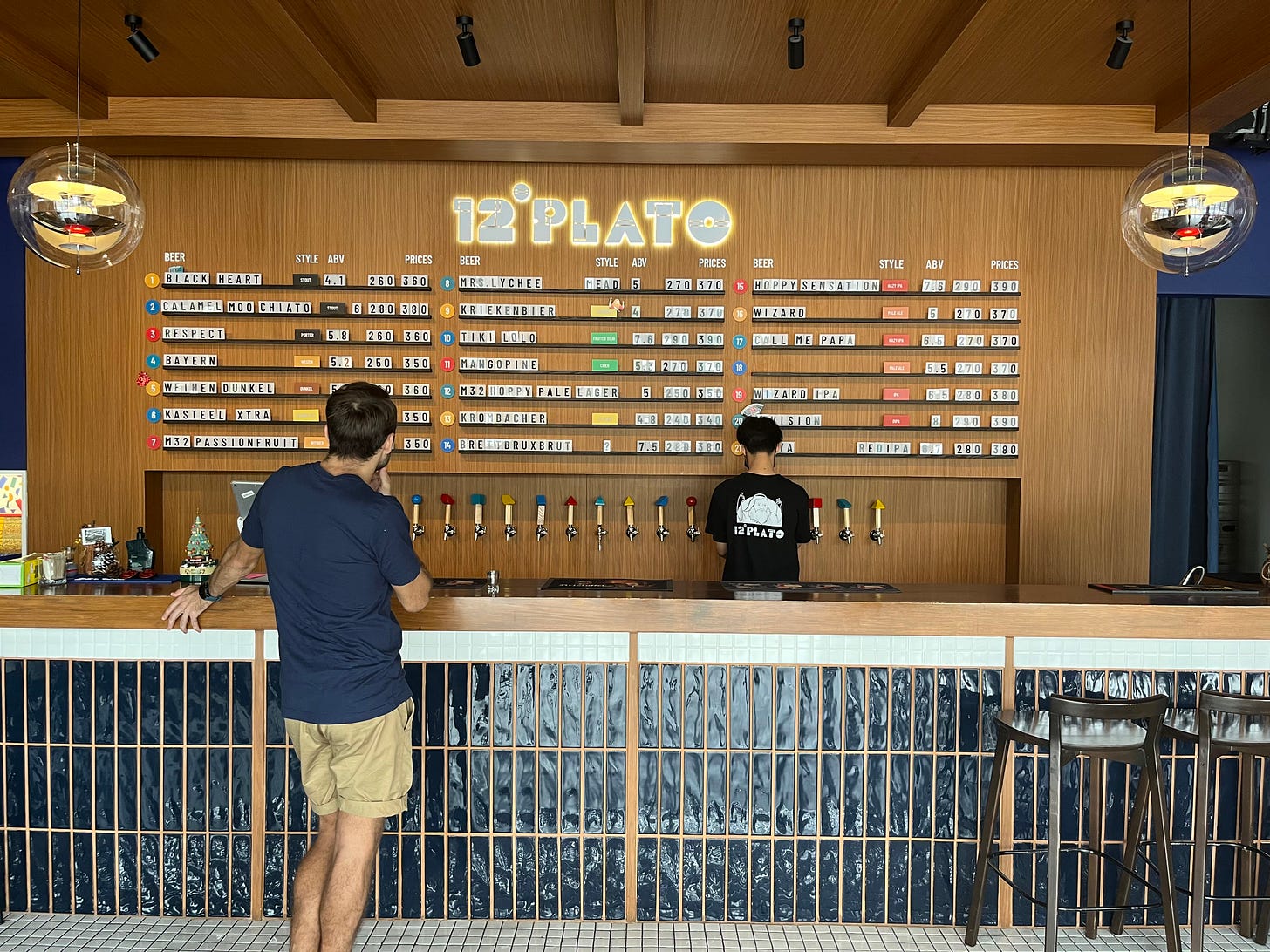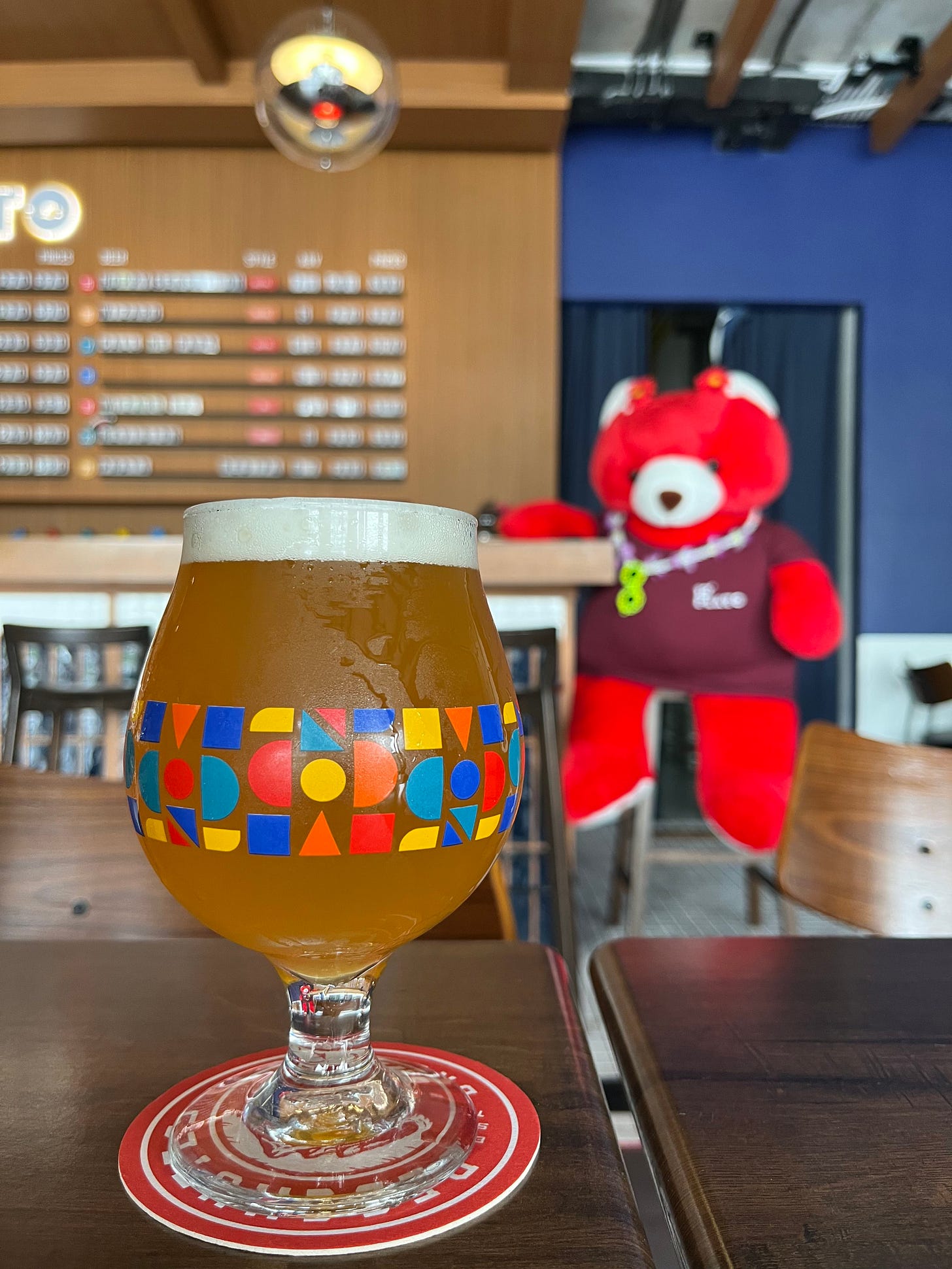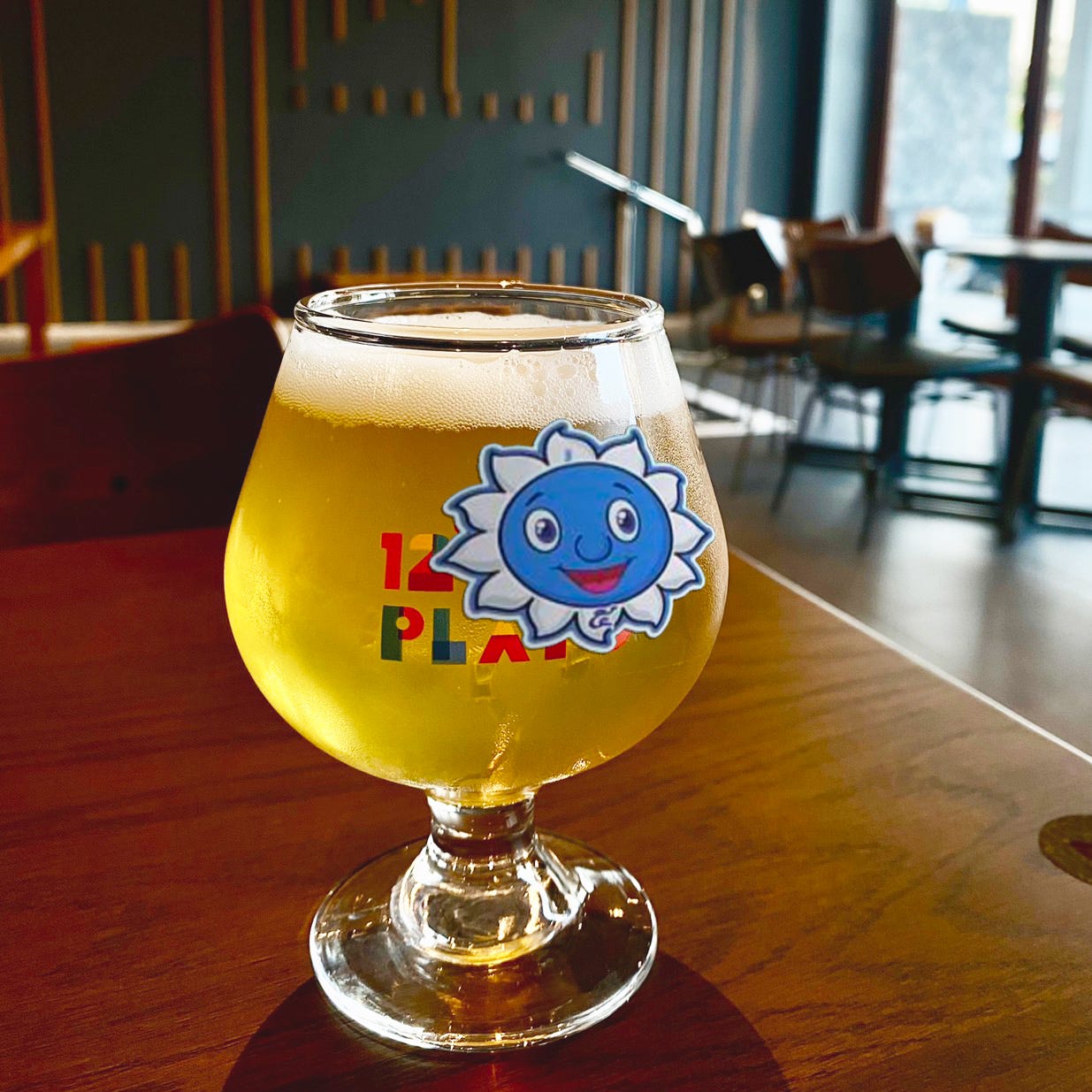So you want to open a brewery.
Here’s how 12 Plato, Bangkok’s latest microbrewery to get licensed, made it happen.
Me, your guy, the author at 12 Plato on a much less rainy day a couple of months ago.
For those who come from lands with an abundance of craft breweries, 12 Plato will feel familiar.
It’s high gloss and high quality, carefully planned and developed inside and out, from the design and branding to the food, the events, and, of course, the beer on tap. Like something you would find in the U.S., in other words.
As you pull into the parking lot, you’re greeted by the outdoor drinking space of your dreams. Here, the brewery’s technicolor logo glows above a spacious patio that’s easy to imagine packed with people once the rainy season passes.
Behind the sliding glass doors, warm lights shine down like a beacon on 21 taps set within an amber wood wall. There are hefeweizens, stouts, a kettle sour or two, and pretty much every iteration of pale ale you can think of: hazy, West Coast, English.
On the food menu, you can pick from cantina-style quesadillas, juicy burgers, steaks, and other well-executed bar fare.
In one corner of the room, there’s space for DJs and bands to play. In the other, there are 10 tanks—at least, there will be 10 tanks really soon—behind a curving glass wall. It’s like a picture window into 12 Plato’s promising operations.
This is an exciting time to be a beer drinker in Bangkok. There are about 10 microbreweries now. A few weeks ago, 12 Plato became the latest.
On a recent rainy Thursday night, I visited the brewery in Bang Na to chat with two of the co-founders, Woranarn “Nan” Saenudom and Sarawut “Bo” Muangsong. I wanted to find out how they managed to land the coveted license to brew beer and get the scoop on what they’re planning now that they have it.
In short: getting the license has taken a lot of time, energy, and resources, but the hardest work—and the most rewarding work—is only just beginning.
How it started
Ever heard of Charmyai? If you have, then you’ll know that Bo and Nan aren’t new to making beer.
Along with another partner, Nut Promsak—a web designer by trade and the brewer behind the local label Two Fish Beer—they’ve put out popular beers like Chase the Chaos, a sturdy IPA made at Brewlander in Singapore, and Rolling Sunset, their awesome, cinnamon-spiced imperial gose.
Nan also runs Brew By Me, a homebrew shop supplying Bangkok with kits, equipment, and ingredients, while Bo is the brains behind the excellent Eight Days a Week Homebar in Saphan Kwai.
Somewhat quietly and surprisingly—to me, at least—they started cooking up plans to open a microbrewery a few years ago. But it didn’t strike me as such a shocking development once we talked about it.
A Charmyai IPA. Although I can’t recall the name of it, I do remember it was tasty.
The two had been contract-brewing for years and knew and/or were fed up with the pain points, like quality control, making connections, and getting their beers in the queue to be made as demand for contract-brewing surges.
“About three years ago, we all came together and said, ‘Why don’t we open a brewery ourselves?’” Nan explains.
So that’s what they did. But if you’ve been paying attention to the legislative goings-on in Thailand (and why wouldn’t you?), you’ll note that they set out to get a license before a regulatory change made it a little easier to do it.
Previously, would-be brewers needed to have THB10 million (about US$300,000) in registered capital and the capacity to make at least 100,000 liters of beer annually. Last November, the Thai cabinet swiftly amended the law, scrapping these requirements.
“We applied for it while the law was changing,” Nan says. They had already come up with THB10 million in registered capital, for example. But registering funds was just one part of a process that was head-scratching, humorous, and Kafkaesque.
“We had to find money, find a location, come up with a business plan, branding—everything,” she says.
Finding the right fit
On their wish list was a place that, first of all, could accommodate a 500-liter brewing setup and 150-plus people. They also wanted a parking lot and room to roam outside to cater to families and pet-owners.
Setting aside the fact that they needed to find a landlord amenable to housing a brewery, current laws also presented some, let’s say, unusual stipulations.
“It couldn’t be too close to schools, temples, or gas stations,” says Bo. “We needed to have a road or building between the brewery and [those buildings]. They just couldn’t be connected.”
“Even if there was a river or canal nearby, [we couldn’t get approval],” Nan adds.
This patio: you’ll be drinking here. / Image courtesy of 12 Plato.
They started looking in downtown Bangkok. With rent soaring in Bangkok, and there being a remarkable number of temples and schools, they started looking beyond the downtown core to find something more suitable.
In June 2021, Bo found a brand-new building in Bang Na, set across a parking lot from a serviced apartment. “It was just a building: no flooring, no windows,” he says.
Two months later, they secured a long-term lease and eyed their next hurdle: infrastructure.
The team had to install pipes and a tap system, lay down epoxy, design and build the interiors, set up their tech, and source a 500-liter fermenter, 10 tanks, and other brewing equipment, which they eventually got from a provider in China.
Bureaucracy: making the possible impossible
The money, location, and business plan are the tip of the bureaucratic spear, if you will—necessary requirements, but not enough to sell beer. The next step involves getting everything—and I mean everything—approved by the excise department.
The tanks and fermenter should be in place by the end of August, says Bo. After it’s all in working order, the excise department must approve their setup.
No one really knows when these officials will drop by. It could be days or weeks after the co-founders submit their request for approval. But once 12 Plato does get the go-ahead, they can start brewing.
Actually…
“You have to get every beer recipe approved by the excise department,” Bo tells me.
Want to make a rotating, seasonal selection of beers? Pump the brakes. The excise department must approve each of them.
This is why you come here. / Image courtesy of 12 Plato.
Another fun one: brewers also must send excise officials itemized lists of their ingredients, broken down by how much of each they will use every month. “I’m not sure they know what these ingredients are used for,” Bo says with a laugh.
The whole point of this process is to enable the department to tax the beers properly.
Under current regulations, microbreweries like 12 Plato also can’t bottle or can their beers and sell them off-site without receiving an environmental impact assessment. Getting this seal of approval, I’ve been told, requires lots of time, money, and a minimum brewing capacity. The law, as ever, is murky.
“It’s so complicated,” Bo admits.
Oh, I almost forgot: the beer!
At 12 Plato, Bo and Nan hope to have seven core beers on top—mostly light, approachable beers—as well as seven rotating selections and seven guest beers from fellow Thai breweries. Achieving these tap goals will require manpower.
Brewing is a full-time job. It takes muscle, sweat, and focus. The best breweries are structured properly so that the brewers can brew, and that’s that.
Bo has spent a lot of time behind the brew kettle, as well as many weeks visiting operations across the U.S. and Asia to see how they function. He gets it. Not everyone grasps that when they set out to start a brewery in Thailand, though.
“Going from amateur to professional is hard. It takes a long time to brew [good] beer,” Bo says. “You need to do everything. You need a team, staff, money, technical expertise, connections, you need to deal with the government. If you don’t have brewing knowledge, it’s hard to do. If you don’t have money, it’s super hard to do.”
Want to start your own brewery in Thailand? Bo says you should maybe just think about it a minute first.
Daunting though it was, 12 Plato has ticked almost all the boxes. Now, they’re looking for two full-time brewers so they can get their beer on tap before it’s too late.
Under current rules, breweries can’t sell a beer they’ve made onsite sooner than 90 days after getting their license, but they also must put out a product within 270 days of getting it. In other words, there’s a six-month window to get everything up and running and put beer in customers’ bellies.
Bo and Nan think they will release their first beer brewed at 12 Plato a few months from now. “Maybe around our one-year anniversary in November,” says Nan.
Wondering what it will be? According to Bo, probably be a hefeweizen—a beer everyone can enjoy, and one that’s more forgiving on the budget if something goes haywire the first time they make it.
What next?
Don’t expect to see 12 Plato bottles at 7-Eleven anytime soon. Or ever, for that matter. Bo, Nan, and company have made smart, calculated moves every step of the way. Arguably the smartest is not going beyond their means.
Rather than flooding the market with their products, they intend to set up satellite bars and venues across Bangkok, and even as far away as Chiang Mai. With an ownership stake in these venues, they should be able to send them kegs of beer legally and steadily expand their footprint over the next three to five years.
This arrangement might also help them bring costs down. Bo and Nan hope that they’ll be selling 330ml pours for THB180 when things really get moving.
“The price wars are coming,” says Bo, to the delight of beer drinkers across Thailand.
While their journey to this point hasn’t been exactly linear, the 12 Plato team has managed it well. There’s a plan in place, and they’re sticking to it. And now that they’ve navigated the most complicated part of the process, they have advice to share with other would-be brewery owners.
“If you’re thinking about opening a brewery, ask yourself, are you ready?” Bo says. “Are you sure you want to do this?”








Wow! Thanks for this interview and well cover on details. We hope Thailand will change in a good ways soon.